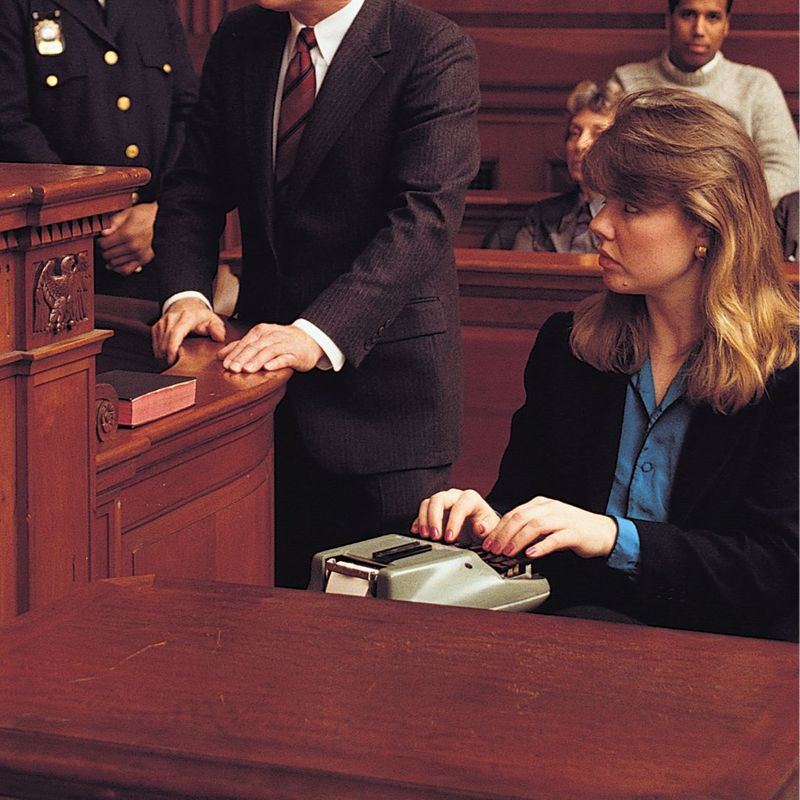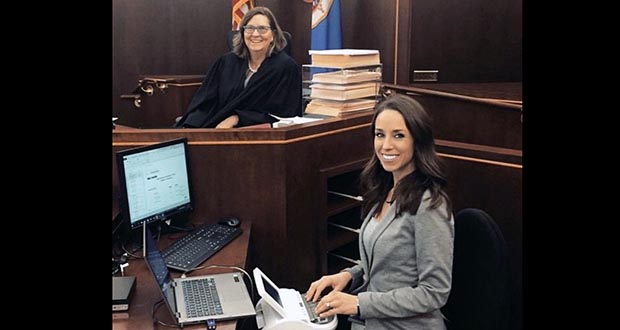Factors to consider when hiring durham court reporting professionals
Wiki Article
Just How Court Reporting Works: A Step-by-Step Overview to the Legal Process
Court reporting is a crucial element of the legal system. It entails a structured process that assures exact paperwork of procedures. From prep work to the final distribution of transcripts, each step is vital. Understanding exactly how stenotype reporter operate offers insight into the honesty of legal records. The nuances of their work can profoundly affect lawful end results, triggering concerns concerning the innovations and methods they employ. What are the details strategies that define this profession?The Role of Court Reporters in the Legal System
Stenotype reporter play an essential role in the lawful system by giving precise and dependable transcripts of court procedures. Their job warranties that every spoken word during hearings, depositions, and tests is documented, which is vital for keeping an official record of occasions. This transcription is fundamental for allures, as it allows higher courts to evaluate the proceedings and determine if any kind of mistakes were made throughout the trial.Furthermore, court reporters aid in protecting the honesty of the legal procedure by producing verbatim documents that can be described by attorneys, judges, and other events included in a situation. They usually use customized equipment and software program to record dialogue with accuracy. Beyond the court room, their transcripts can work as vital historical papers, providing understanding into judicial procedures and the legal system's performance. Eventually, stenotype reporter add greatly to transparency and liability in legal matters.
Getting ready for a Court Reporting Session
Prep work is necessary for a successful court reporting session, as it guarantees the accuracy and effectiveness of the transcription process. Stenotype reporter begin by evaluating case materials, including pleadings and witness lists, to familiarize themselves with the terminology and context. They also ensure that they have the needed devices, such as steno makers, notebooks, and back-up gadgets, all set for use.Before the session, interaction with lawful groups is vital. Press reporters typically clear up any type of specific requests relating to format or liked terminology. Furthermore, they might prepare to consult with witnesses or attorneys to talk about the process and verify the schedule. Showing up early to establish the tools permits troubleshooting possible technical concerns. In general, extensive prep work not just enhances the press reporter's confidence however additionally contributes considerably to producing a accurate and clear record of the legal procedures.

Capturing the Record: Techniques and Tools
Using innovative methods and reliable devices, court press reporters carefully catch the spoken word during lawful process. They utilize stenography, an approach entailing a specialized machine that permits them to kind multiple sounds concurrently, consequently transcribing dialogue in actual time. This maker, known as a steno keyboard, is furnished with secrets that represent words and syllables, enabling swift and accurate input.
In addition to stenography, stenotype reporter might utilize audio recording tools as supplementary tools. These devices work as back-ups, guaranteeing that no crucial information is lost throughout proceedings. Some press reporters include software that boosts their transcription efficiency, supplying functions such as voice recognition and automated formatting.
Correct positioning and focus are critical; reporters have to preserve focus on all speakers, catching nuances and inflections that contribute to the record. Through a combination of skill and modern technology, court press reporters promote the stability of the legal process by making certain a thorough and accurate document of occasions.
Recording the Process
Recording the process needs court reporters to transform talked discussion into created text with outstanding precision and rate. This process commonly happens immediately after the recording has been caught, making use of specialized software program that permits for seamless transcription. Court press reporters should pay attention diligently to the audio, guaranteeing that every word, inflection, and time out is properly stood for in the transcript.They typically count on shorthand systems, personal transcription abilities, and advanced innovation to promote this job. The environment in which they work can be busy and occasionally chaotic, as lawful procedures typically involve multiple speakers and technical jargon. Stenotype reporter should also keep concentration to record subtleties in tone and context that might be vital for the lawful record. Inevitably, the accuracy of the transcription is vital, as it works as a certification for future recommendation in legal procedures.
Examining and Editing the Records
The procedure of examining and editing and enhancing the records is vital for making certain precision in court reporting. Court reporters often team up with lawyers to make clear any ambiguities and validate the correctness of the recorded declarations. This partnership is essential for preserving the stability of the legal record.Significance of Accuracy
Accuracy serves as the cornerstone of reliable court reporting, as also small errors can greatly modify the significance of lawful proceedings. The evaluating and modifying process is crucial in making sure that records mirror the talked word with integrity. Court reporters thoroughly confirm names, technological terms, and lawful lingo to maintain Web Site precision. This attention to information helps stop misunderstandings that can affect situation outcomes. Precision cultivates trust among legal professionals, customers, and the court, enhancing the integrity of the judicial system. Errors can result in disputes or charms, making it imperative for press reporters to improve their job thoroughly. Eventually, the pursuit of accuracy not only improves the dependability of the transcript but likewise promotes the criteria of the legal occupation.Cooperation With Attorneys
Collaboration between court press reporters and lawyers is crucial throughout the reviewing and editing stage of transcript manufacturing. This process ensures that the last file precisely shows the spoken word and sticks to legal criteria. Lawyers often review transcripts for certain terms, context, and any type of prospective errors that could affect the case. Stenotype reporter rely upon lawyers' knowledge to make clear ambiguous areas or emphasize crucial statements. Efficient communication is essential; attorneys might supply responses or request corrections, which stenotype reporter must deal with without delay. This collaboration not just enhances the top quality of the transcript but additionally contributes to a smoother lawful process. Ultimately, collective efforts result in a specific and reliable document, necessary for lawful procedures and future recommendations.Delivering the Final Records to Clients
Click Here Upon completion of the transcription procedure, court reporters meticulously prepare the final paper for distribution to their customers. This last transcript undergoes detailed checking to assure precision, as any kind of mistakes might considerably affect lawful process. Stenotype reporter style the file according to the specific needs stated by the clients or lawful firms, including pagination, indexing, and any type of necessary displays.
Finally, stenotype reporter may supply a cover letter summarizing key information and offering additional aid if required. This complete approach warranties that clients obtain a sleek, specific, and conveniently navigable records, essential for their lawful demands.
Often Asked Questions
What Qualifications Are Required to Become a Stenotype Reporter?
To end up being a stenotype reporter, he has a good point individuals typically require a senior high school diploma, completion of a court reporting program, and qualification or licensure, depending on state demands. durham court reporting. Efficiency in shorthand and modern technology is also important for successHow Lengthy Does It Take to Full Court Reporting Training?
Commonly, completing court reporting training takes in between 18 months to 4 years, depending upon the program's intensity, the trainee's pace, and the specific requirements of the jurisdiction in which they want to practice.
What Is the Ordinary Wage of a Court Reporter?
The ordinary salary of a stenotype reporter varies by place and experience, typically ranging from $45,000 to $100,000 annually (durham court reporting). Variables such as specialization and demand can substantially influence their profits in different regionsAre Court Reporters Required to Have Accreditation?
Court press reporters are generally needed to obtain accreditation, which assures they have the needed skills and knowledge for exact transcription. Accreditation needs can vary by state or territory, showing expert criteria within the lawful community.Can Court Reporters Job Remotely or Freelance?
Court reporters can function remotely or freelance, supplying flexibility in their occupation. Many utilize technology to record process from various areas, permitting varied opportunities in the lawful field while preserving a work-life equilibrium.Court reporters play a vital duty in the legal system by providing trusted and precise transcripts of court procedures. In addition, court press reporters help in maintaining the stability of the lawful procedure by creating verbatim documents that can be referred to by attorneys, courts, and other celebrations included in a situation. Using advanced methods and trusted equipment, court reporters thoroughly capture the spoken word during lawful proceedings. Court reporters have to additionally maintain concentration to record nuances in tone and context that may be necessary for the legal document. To become a court reporter, individuals generally need a high institution diploma, completion of a court reporting program, and accreditation or licensure, depending on state demands.
Report this wiki page